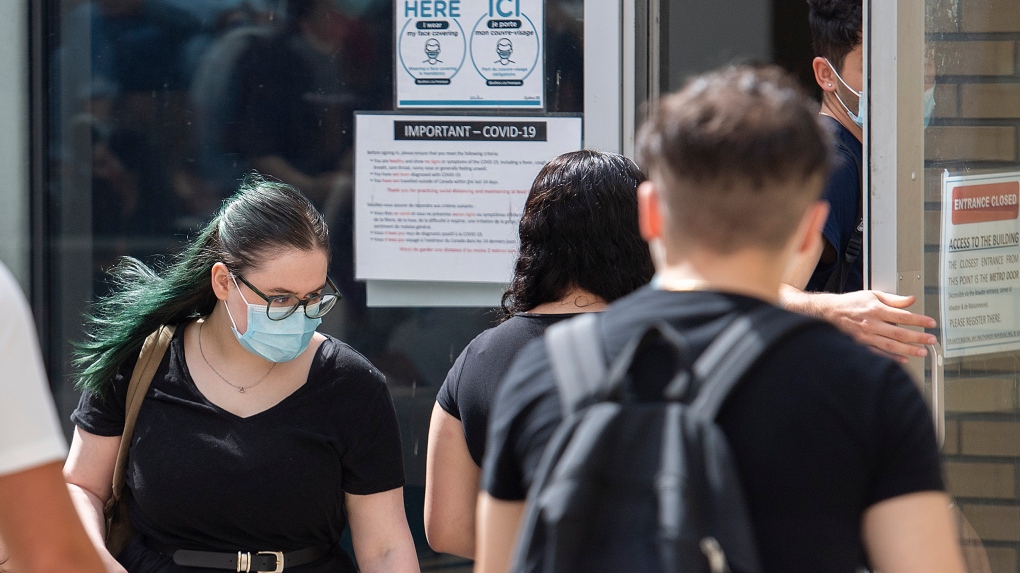Quebec university students scored high with COVID-19 compliance: McGill study
 Students are shown wearing masks at Dawson College in Montreal as they return to in-class learning on August 23, 2021. -- FILE PHOTO (THE CANADIAN PRESS/Graham Hughes)
Students are shown wearing masks at Dawson College in Montreal as they return to in-class learning on August 23, 2021. -- FILE PHOTO (THE CANADIAN PRESS/Graham Hughes)
University students in Quebec did quite well at following COVID-19 restrictions such as wearing a mask and social distancing, McGill University researchers have found.
As many as 78 per cent of students wore masks and respected the two-metre distance rule in a university library at the height of the pandemic in 2021.
This is the first study in the province using direct observation to examine compliance with pandemic-related health measures.
"We believe that these results are of great value for the general public, as they provide the first scientific feedback on the behaviour of a specific population toward COVID-19 preventive measures during a critical period of the pandemic," said Yohann Pilon, the study's lead author and Doctor of Medicine candidate at McGill University.
The students' score is just two points away from the 80 per cent threshold "suggested as necessary" to reduce the spread of COVID-19, according to the study.
Pilon's work suggests that university libraries can remain open in the event of a future COVID wave, as long as appropriate safety measures are in place.
"It may also support public health authorities and university administrators in implementing future health policies that would lead to the safe maintenance of as many in-person activities as possible if faced with another surge in COVID-19 cases," he added.
This study made a total of 2,109 observations in a Quebec university library from March 28 to April 25 last year.
CTVNews.ca Top Stories

LIVE NOW Budget 2024 prioritizes housing while taxing highest earners, deficit projected at $39.8B
In an effort to level the playing field for young people, in the 2024 federal budget, the government is targeting Canada's highest earners with new taxes in order to help offset billions in new spending to enhance the country's housing supply and social supports.
BUDGET 2024 Feds cutting 5,000 public service jobs, looking to turn underused buildings into housing
Five thousand public service jobs will be cut over the next four years, while underused federal office buildings, Canada Post properties and the National Defence Medical Centre in Ottawa could be turned into new housing units, as the federal government looks to find billions of dollars in savings and boost the country's housing portfolio.
Some of the winners and losers in the 2024 federal budget
With a variety of fiscal and policy measures announced in the federal budget, winners include small businesses and fintech companies while losers include the tobacco industry and Canadian pension funds.
From housing initiatives to a disability benefit, how the federal budget impacts you
From plans to boost new housing stock, encourage small businesses, and increase taxes on Canada’s top-earners, CTVNews.ca has sifted through the 416-page budget to find out what will make the biggest difference to your pocketbook.
Police to announce arrests in Toronto Pearson airport gold heist
Police say that arrests have been made in connection with a $20-million gold heist at Toronto Pearson International Airport one year ago.
Teen hockey players arrested for sexual assault following hazing incident: Manitoba RCMP
Three teenagers were arrested in connection with a pair of alleged hazing incidents on a Manitoba hockey team, police say.
'I Google': Why phonebooks are becoming obsolete
Phonebooks have been in circulation since the 19th century. These days, in this high-tech digital world, if someone needs a phone number, 'I Google,' said Bridgewater, N.S. resident Wayne Desouza.
Liberals aim to hit the brakes on car theft with new criminal offences
The Liberals are proposing new charges for the use of violence while stealing a vehicle and for links to organized crime, as well as laundering money for the benefit of a criminal organization.
BUDGET 2024 Ottawa police get $50 million to boost security around Parliamentary Precinct
The Ottawa Police Service will receive $50 million in new federal funding over the next five years to "enhance security" around the Parliamentary Precinct.































